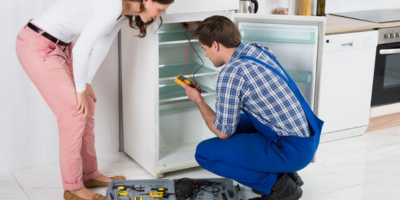It’s always when you least expect it. One minute your fridge is humming along, doing its quiet, everyday job of keeping things cold and uneventful. And the next? A sad puddle of melted ice cream, wilted lettuce, and a whole chicken that now belongs in the trash. That’s the chaos I woke up to one Saturday morning—and if you’ve been there too, you know just how stressful that can be.
The silence was the first clue. Usually, there’s a low background buzz from the kitchen, the kind of thing you don’t notice until it’s gone. That morning, it was eerily quiet. When I opened the refrigerator, it felt… too warm. Like the kind of warm you never want near your milk or yogurt. And the freezer? Forget it. Popsicles had become juice bars.
Cue the internal panic.
Realizing It’s Time for Help
After about thirty minutes of denial—turning dials, unplugging and re-plugging cords, poking at the back panel—I had to face it: I needed professional refrigerator repair. And fast. Not just for the food, but for my sanity.
What I learned along the way was surprisingly helpful, and honestly, stuff I wish I’d known before. If you’re currently dealing with a stubborn fridge or just want to be prepared for the future (because let’s face it, these things never happen when it’s convenient), stick around. This might just save you some time, money, and a headache or two.
Diagnosing the Not-So-Cold Problem
Here’s something I discovered pretty quickly: “broken” doesn’t always mean dead. Sometimes, a fridge just isn’t doing its job well enough. The top shelves feel fine, but the veggies below are wilting like neglected houseplants. Or maybe your freezer’s colder than Antarctica but the fridge compartment is oddly room-temp.
This unevenness usually means airflow is blocked or the thermostat’s playing tricks. When my fridge not cooling issue popped up, it turned out to be a faulty evaporator fan. A quick fix, thankfully—but only once the right person with the right tools showed up.
In the meantime, I learned a few signs that hint at what’s going wrong:
- A clicking or buzzing sound? Could be a compressor problem.
- Frost buildup in the freezer? Defrost system might be shot.
- Constant cycling on and off? Thermostat or dirty coils might be to blame.
And here’s the kicker: letting these small symptoms linger can turn them into expensive disasters.
The Ice-Cold Truth About Freezer Fails
Now, the freezer deserves its own spotlight. When it’s running well, it’s magic—stocked with leftovers, emergency frozen pizzas, and those “just in case” ice packs you forget about until you need them.
But when things go south? That magic turns into mush.
A neighbor recently dealt with a complete freezer failure that resulted in meat juice dripping through their entire fridge. Trust me when I say that smell doesn’t come out easy. They needed full-on broken freezer service—a new fan motor, defrost timer, and a cleanup crew for the interior. It wasn’t cheap. And unfortunately, insurance doesn’t usually cover appliance repairs.
That’s why early action matters. The minute you suspect something’s off—whether it’s noise, warmth, or smell—make the call.
Finding the Right Repair Tech (and Not Getting Burned)
Look, anyone can slap a magnet with a phone number on your fridge. But that doesn’t mean they’re trustworthy. When I was looking for help, I dug through online reviews, asked my neighbor Steve (he knows everyone), and eventually found a local technician with a reputation for honesty.
Ask questions. Get a quote before they start. Make sure they offer a warranty on the work. Good repair techs aren’t offended by due diligence—they appreciate customers who take their appliances seriously.
And don’t fall for the “you might as well buy a new one” line too quickly. Sometimes repairs cost a fraction of replacement, especially if your fridge is less than ten years old and you’ve kept up with maintenance.
A Few Tips to Avoid Another Cold Crisis
Once everything was fixed, I promised myself I wouldn’t be caught off guard again. Here’s what I do now:
- Clean the coils every six months (you’ll be amazed how dusty they get).
- Don’t cram food against the air vents—airflow is essential.
- Keep a thermometer in both compartments so you’ll know if temps slip.
- And yes, I bought a cheap backup cooler… just in case.
Final Thoughts: Chill, But Be Proactive
Appliances are like cars. They work—until they don’t. But unlike cars, we often assume our fridges are invincible. They’re not. They need care, attention, and sometimes, a little expert help.
So if your refrigerator’s acting up or your freezer’s throwing a tantrum, don’t wait for your groceries to become science experiments. Call a pro, ask questions, and get it sorted before it gets expensive—or smelly.
Because trust me, the next time your fridge goes silent, you’ll want to be the one in control.
